The push to use ‘inclusive language’ in conversations that are applicable to a vulnerable group has predictable and disastrous effects on that group.
Our efforts to be inclusive have known no bounds in the last few years, as we have attempted to ensure that all members of society feel accommodated and welcome. Not only in spaces and representation, but also in our language – in how we attempt to categorise and define the world. In fact, one may argue, that this has been the primary focus of most attempts to be inclusive. It would appear that changes in language are deemed to be one of the most crucial aspects of being a person who truly cares about social justice.
The best thing about inclusive language, for the well-meaning person (of which there are many, no doubt) – is simply how easy it is to do. It doesn’t hurt any of us – or so it is argued and believed – to change the words we use to protect the feelings and sentiments of a vulnerable group. Which leads to frustration when one does not accommodate, when one does not use language as they should to protect these feelings. It can be easy to believe that only a truly despicable person would deliberately use the wrong words that cause suffering and harm. But as recent events prove, those who resisted the use of so called ‘inclusive language’ were right in their fears – that people who are told to stop being afraid of using accurate language in the interests of being inclusive, find themselves being eliminated and obscured in a conversation in deference to the other group that is demanded to be included. This results in erasure of the people and interests that are demanded to be inclusive.
There is no clearer example of that than reddit’s recent controversy, among other controversial bans, over the /r/PCOS subreddit. A space created to discuss the common and sometimes debilitating condition of Polycystic Ovary Syndrome recently went private due to a conflict over alleged ‘transphobia’. The subreddit is now back up for public access, with new highlighted rules that ask members to use “inclusive language” to discuss their struggles. The team of moderators has also changed to reflect more inclusive values and a more diverse group. The current narrative implies that it was “TERFs” who brigaded the subreddit and caused these issues. However, the post that prompted this issue tells another story.
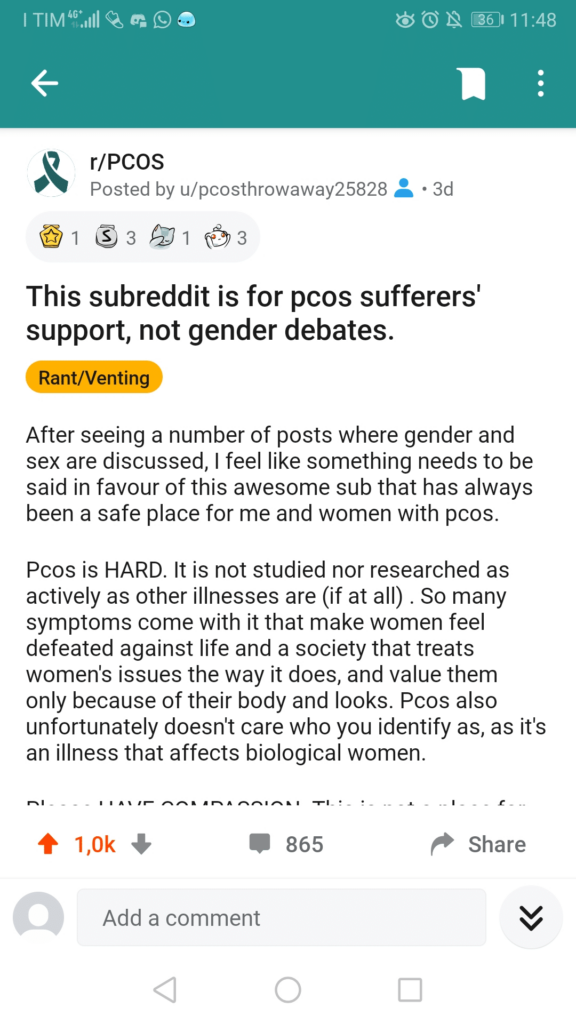
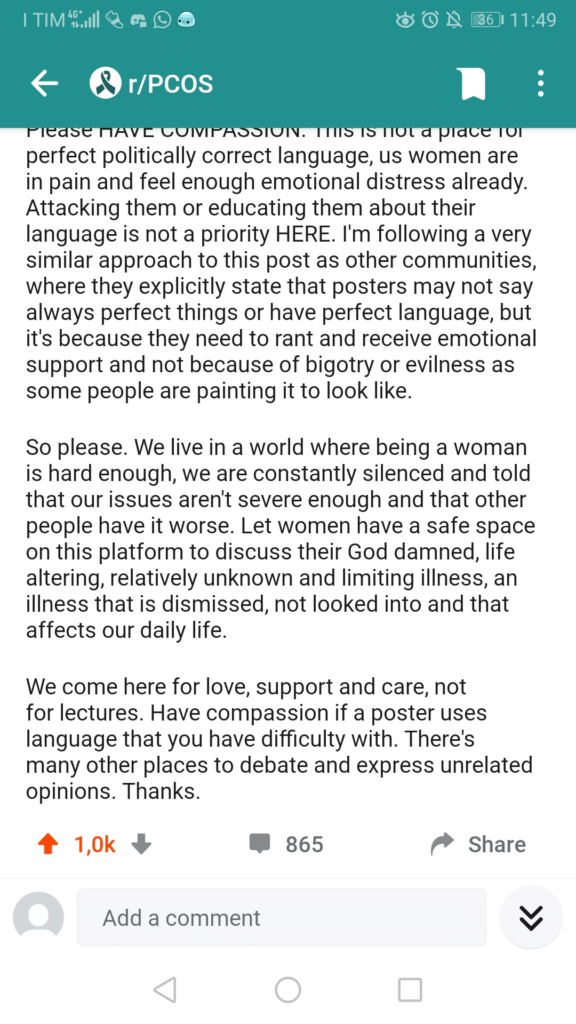
The user’s post reflects the exhaustion with having language discussing female anatomy and women’s struggles with PCOS be controlled, with being cornered and berated for daring to use female specific anatomical terms to describe their sickness, thereby leading them to censor themselves and not discuss their struggles the way they’d want to because of complaints that it resulted in the apparent non-inclusion of trans women and non binary people. Many women were in agreement, and did not want the words they use to be policed in this manner – especially when they were struggling with a condition that was debilitating and painful. The subreddit has always been welcoming of transmen and nonbinary people.
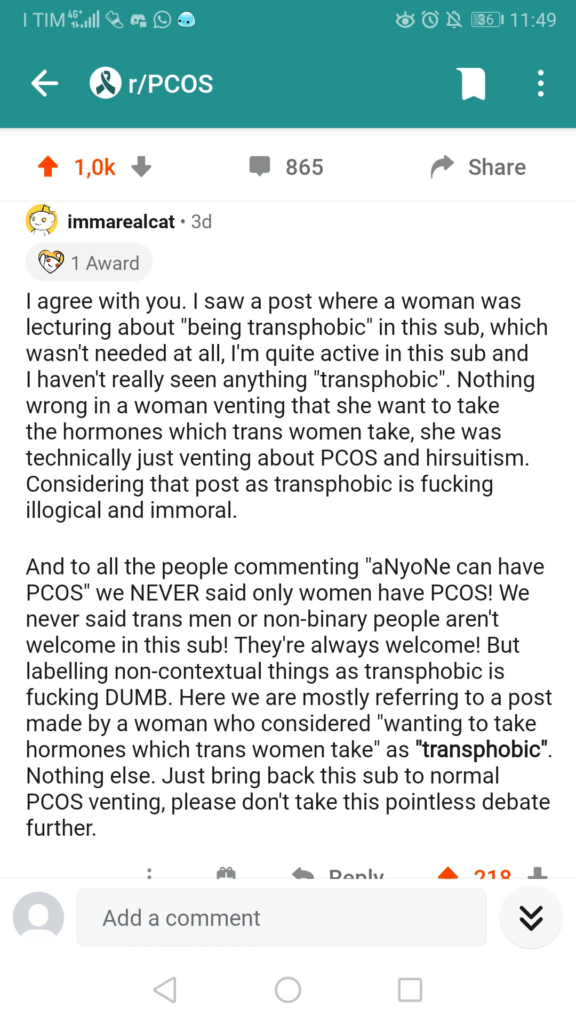
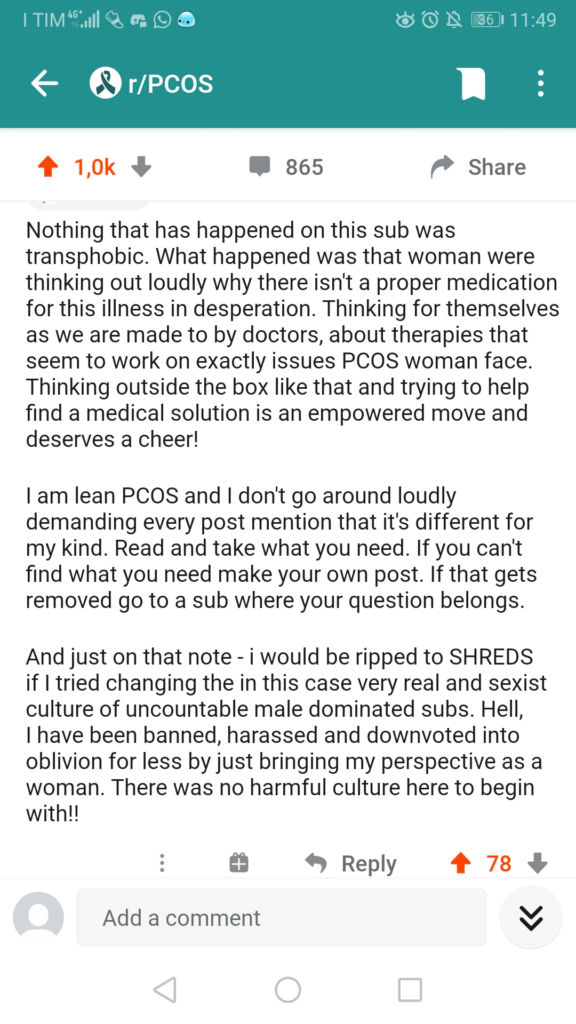
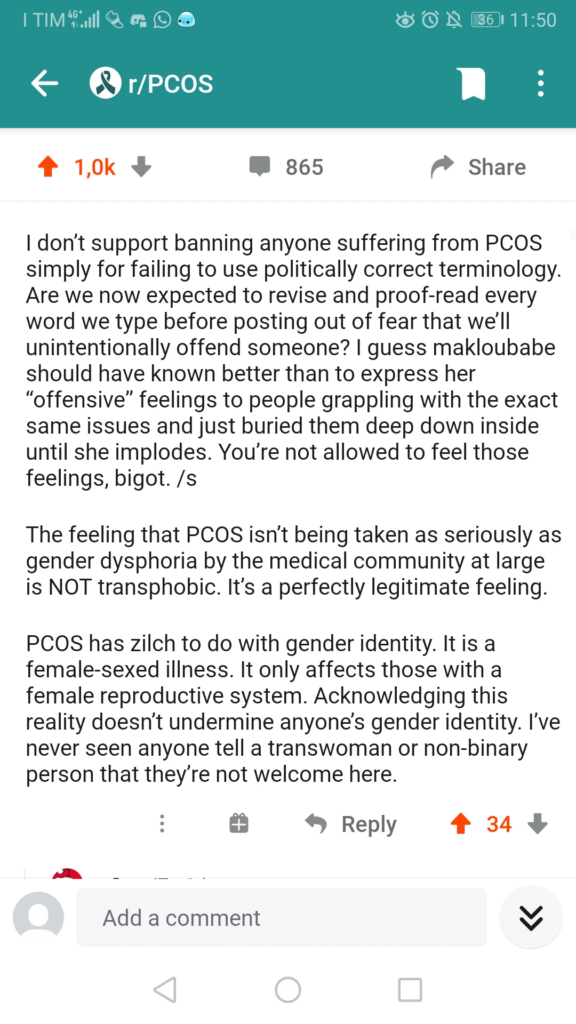
However, the topic of inclusive language came up recently in the context of transwomen, who discussed what they have in common with women suffering from PCOS and why the discussion needs to suit their sentiments, as well.
There is something suspect about this – a condition that only affects women (and only affects those with a female anatomy) and will naturally have sexed language to describe it, should not be seen as transphobic. Neither can someone with male anatomy claim any kind of ownership over a struggle faced uniquely by those with female anatomy. /r/truepcos was created for women to discuss their issues without concerns of using transphobic language – this too was banned, despite suggestions that such a subreddit could be created for “cis-women” only.
The harms of ‘inclusive language’
The concept of inclusive language in and of itself may be well-intentioned. In fact, in some cases, cultural shifts in language are necessary. Using racist and sexist slurs is wrong, for example, and challenging these words is not a problem. However, it appears that the bar is quite unreasonable when it comes to transphobia. Describing the female anatomy as belonging to females should not be considered transphobia. It is also harmful to deny women the ability to talk about their anatomy and their specific struggles without fear of consequence. Here’s why:
- It is exclusive to women from different cultures, different socio-economic backgrounds, and those who speak different languages
The accommodating and inclusive language used for trans and non binary identities is already confusing and hard to understand for the most well-meaning English speakers. It is unrealistic to attempt to make language “inclusive” of people and issues that it is specifically not applicable to (language that already exists and perfectly describes all conditions in sexed terms) in order to favour a tiny percentage of the population. Simplicity of language and concepts is also important for women of varying social strata to understand their concerns and to access information and knowledge easily. Uneducated women, women from lower socioeconomic classes, women from different cultures, women who speak different languages – all deserve the right to access knowledge about their own bodies in terms that they understand, that are also medically accurate. While it may have been thought to be less of a challenge to impose inclusivity on a language like English, the fact is that English, as lingua franca, is the frame of reference used even in other languages to describe women’s health. Demanding that women’s reproductive language be avoided so that people without female anatomy will nevertheless feel ‘included’ in all conversations among women, deprives women of the basic tools to talk about their bodies. The short-sightedness of such a move speaks to the deliberate dismissal by those advocating for this kind of inclusivity in language, of women of different backgrounds. It seems to be the dominant concern of an upper class minority, and does not consider the practical implications for those who do not share this background.
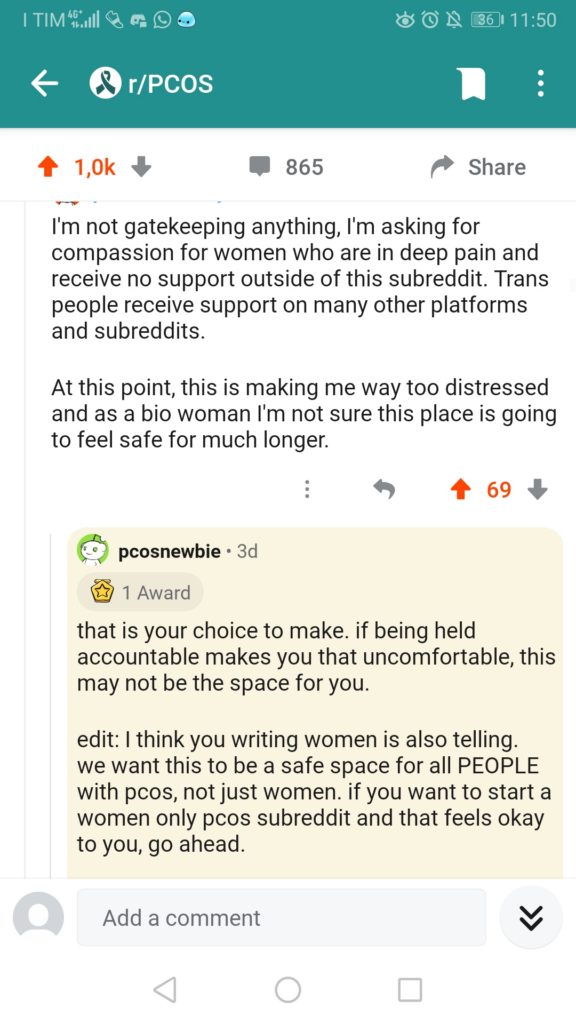
- It prevents women from speaking freely about topics that are still steeped in stigma.
We haven’t yet achieved proper education on the female anatomy for women. Topics around menstruation, infertility, sexually transmitted diseases, and even sexual pleasure are still shrouded in taboo, mystery, and don’t come under in-depth discussion. Women are kept away from accessing knowledge about their own bodies – especially because women just have few words – ‘women’ in relation to ‘uterus’, ‘ovaries’, ‘vagina’, etc. How else are women supposed to talk about their unique medical needs and issues? This kind of obfuscation makes it much more difficult for women to understand their own bodily needs, issues, and concerns. Further stigmatising and shaming women for discussing issues around the female body as “transphobic” or “offensive” hurts this cause tremendously. Research on female medical issues are already underfunded and hardly find representation – which has led to lack of diagnoses, negligence, injury, and even death. If we remove the language by which we talk about these issues, we exacerbate this problem.
- It is a demand made unfairly of women, which reveals a push by a specific group, men transitioning to women, towards women – a clear indicator of disparate misogyny.
Accusations of transphobia are hardly ever hurled towards male health issues and their discussion. Males are free to discuss their prostate issues, erectile dysfunction, circumcision, and so on without having to accommodate the feelings of transmen or even accommodate transwomen (who may actually suffer from these issues) in the same.
When one sees this disparity in treatment, it isn’t to say that men must be subject to the same – rather, it is to point out the double standards and hypocrisy thereby highlighting the misogyny that is prevalent in these accusations. Women’s words are policed and they are held to the highest standards of being accommodating, while men are allowed to freely discuss issues that concern male bodies in the way that they want (as they should). Why is the demand only to encroach on women’s spaces while male only spaces are largely left alone – especially when it concerns issues directly relevant to that particular anatomy?
- When women are forced to split themselves up as discrete ‘organ havers’, we rob them of the ability to describe themselves as fully human.
Those who force women to refrain from using language to describe their very existence, and instead describe themselves in these discrete parts, individualise and alienate them and lead to a situation where their communities are demonized.
It may be argued that the transwomen who complained about r/pcos, leading it to be shut down, are a fringe group. This is indeed the standard response whenever concerns are raised about what is being termed as ‘transphobic’ by the majority of allies – that every example of excess, every unreasonble act by transgender activists is merely a small fringe of the movement, not to be concerned about. But this fails to acknowledge the simple, expected progression of the demands made under the guise of ‘inclusive language’.
Many allies of trans activists will argue that what happened to r/pcos was unfortunate, but hardly the consequence of using ‘inclusive language’. Except, to any reasonable observer, it is patently clear that it is the direct consequence of the demands on inclusive language. The attack on r/pcos, and the demands that women should not use words describing their anatomy in relation to their lives as women, is an obvious, direct and predictable consequence of the virulent demands to separate being a ‘woman’ from being ‘female’. Consider this – if women are not female, as the current rhetoric demands, then that logically indicates that female problems are not women’s problems, and that women, (since they’re not female in this alternate framework) cannot use female specific language to talk about themselves. In this framework, where a woman is not necessarily female, a woman speaking about her anatomy, and connecting her biology to her existence as a woman, is therefore clearly making what is seen to be as an unjustified connection between being ‘female’ and ‘woman’. It is not even a slippery slope from ‘inclusive language’ to the observed complaints, it’s the logical next step – which was and should have been anticipated. The insistence that women should eliminate all traces of ‘femaleness’ while talking about their bodies, to ‘include’ those without ‘female bodies’ and the consequent rage and demands by non-female people that women should self censor so as to not offend them, is the necessary consequence of the demands to be ‘inclusive’.
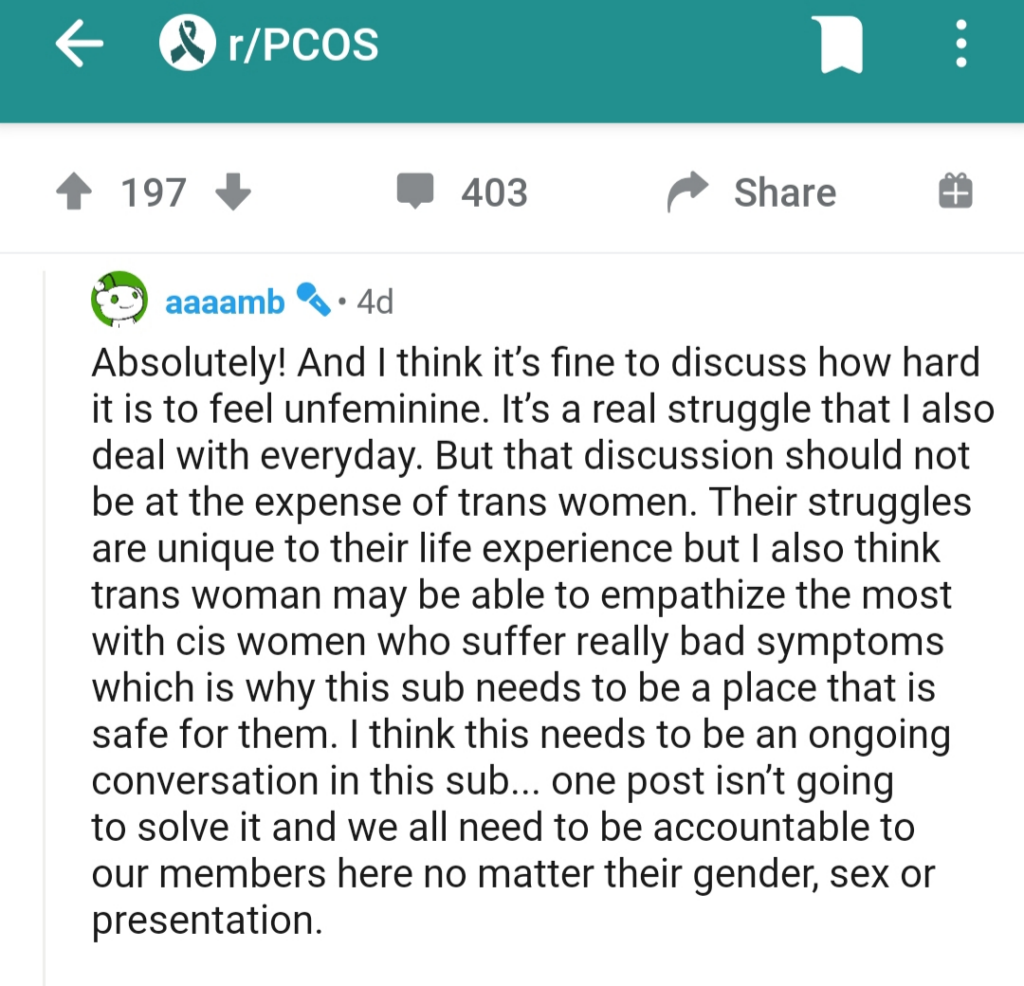
Inclusive language is a misnomer – in these and some other contexts it merely means refusing to use accurate, clear, and obvious terms to validate the feelings of some to whom the conversation at hand is not even applicable which predictably reduces the issue to confusion. Reducing terms to meaninglessness to pay lip service to ‘inclusiveness’ by including persons to whom the conversation is not applicable, naturally results in this. It is the expected outcome.
The dominant sense is that making changes in language is easy, and therefore ought to be expected of everyone. I’d argue that the ease of changing language is in fact, a way to obscure the real difficulties and challenges of creating inclusiveness, and the effects are not just superficial but also harmful. When the focus is on language, we laud large companies that use the right words, while they directly profit off exploitation and abuse. Corporations hide their very obvious and blatant unethical practices under the thin veil of politically correct language. Using the “right language” is no true indicator of progressiveness, it is merely an easy way out of the gruelling work that underlies true activism and social justice. In this case, it is directly harmful to a vulnerable class and community.
Language is important for all groups. It forms the categories by which we understand the world. To suddenly overturn that in the name of false progress, to expect women from disparate backgrounds to unlearn these categories (that are rooted in medical and observable accuracy, rather than constructed phenomena as claimed), to leave them further voiceless in the description of their own bodies, is the true injustice. The careless acquiescence to demands that women should use non-female specific language to describe their lives, in order to ‘include’ people who are not female, predictably leads to this situation – where women cannot discuss debilitating health conditions because female specific language has been rendered meaningless, offensive, and prohibited.
Discuss this on our forum.








Posted by Floriana
19 July, 2020 at 11:41 pm
Too right! And if anyone wants more proof of the double standards that prove this is an anti-woman movement, note that it is female PATIENTS, the ones suffering from female-only illnesses, who will, of course, all be female, who are being targeted. Now look up medical literature, where DOCTORS discuss the very same illnesses, and this remains uncensored. Traditional English prevails, just as it should, and you'll notice many of the doctors are MALE, and free to say 'woman' and 'female'!